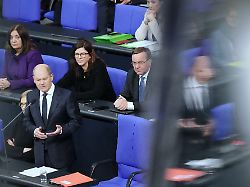The chancellor’s balance of his tank decision is concrete – necessary, responsible and coordinated with the partners. Merz opposes his analysis in the Bundestag, but the most important question still has to be answered.
Government questioning in the Bundestag, and a chancellor who is sure of his cause stands in front of the plenary session. There are “many citizens in this country who are worried,” explains Olaf Scholz in his opening statement on the decision to deliver the Leopard, “also in view of the dimensions that this weapon entails”. At this point he wanted to say to these citizens: “Trust me, trust the federal government.”
The almost paternal-sounding words that Scholz addresses to the population via the plenary hall must fill him with satisfaction. This can be seen in his whole demeanor – much more present and lively than in the New Year’s speech on January 1st. And he can actually go into this government survey relaxed, because in the following hour he will be asked questions there. It will always be Scholz who gives the answers. Who retains the sovereignty of interpretation. Which determines the perspective.
In his subsequent answers, the chancellor’s perspective will be very much focused on the German state of mind. “If we followed their advice, it would be a danger to Germany’s security,” Scholz replied to a question from CDU defense expert Jürgen Hardt. “It would be a terrible mistake,” said Scholz, “to go ahead alone on this issue, to march alone.”
In his question, however, Hardt did not rub at all against the principle of avoiding going it alone. On the contrary: he criticizes the international dispute on the open stage with governments from the Baltic States, for which Scholz, from the CDU point of view, is responsible for his hesitation. He refers to the speech by French President Emmanuel Macron, who said on the anniversary of the Elysée Treaty on Sunday that you are not only judged by the decisions you make, but also by those that you don’t make.
Nobody knows what is right and what is wrong
The criticisms roll off Scholz. He sticks to his narrative that the federal government made its decision based on the principle of close “cooperation and coordination”. There are no mathematical certainties. “Nobody can explain exactly where the right and the wrong decisions are.” That’s why it was right and done with full intention “that we worked our way forward bit by bit”.
It is the same narrative that Scholz has been using for eleven months for every decision on arms deliveries that results from an about-face in its own policy: Heavy weapons are rejected until the decision to supply heavy weapons is made immediately. Until the almost immediate decision to help Ukraine with Marder tanks, tank supplies are proclaimed as not an option. Following the reversal of attitude, Olaf Scholz spread his view that the decision-making took place in a careful process, flanked by consultations with the allies.
The chancellor’s narrative will remain unchallenged until an hour and a half later, the purpose of the parliamentary session is no longer to ask the head of government questions, but to exchange positions. It is the moment when Friedrich Merz steps up to the lectern. The topic of the so-called “Current Hour” is still a kind of relic from the old days, i.e. from the day before: “Leopard Blockade of the Federal Government” is its title.
Since the federal government gave up its negative attitude less than 24 hours earlier and has since described the decision in favor of the leopard as a step that ensures “peace and security”, this debate is actually no longer necessary. But the leader of the Union faction clearly felt the need to compare the chancellor’s satisfied balance sheet with his own point of view.
“In the dark for weeks and months”
In the course of 2022, the need to supply tank weapons – including those of Western design – proved to be more and more urgent, Merz explains. “This has also been the view of a number of allies and allies in the European Union and NATO.” The Federal Republic of Germany and the Federal Government of the Federal Republic of Germany alone “prevented and delayed an earlier decision on this”.
Merz is not only rubbing shoulders with Scholz’s long rejection of tank deliveries, but also with the chancellor’s style of communication. The Chancellor left the public and partners “in the dark for weeks and months as to why he was delaying such a decision to this extent,” says the CDU leader.
And internationally, too, he sees Germany leaving the Leopard debate with wounds, because the damage has been done in NATO and the EU, “that this federal government cannot be trusted, that it has to be pushed, that it has to be pushed to make decisions, that it hesitating and dithering,” summarizes Merz.
It is a fundamentally different analysis of the genesis of German participation in the alliance of battle tank suppliers that comes to light here in the perspectives of first Olaf Scholz and then Friedrich Merz. While both remain in the room as contradicting each other head-on, another question will undoubtedly be clarified in the coming weeks: that of the timeliness of the decision.
In about three months, the new Defense Minister Boris Pistorius promises the delivery of the first main battle tanks. Whether the Russian troops will succeed in consolidating, in coordinating the massive supply of tanks and the new soldiers who will soon be ready as a result of partial mobilization so well that they are ready to go on the offensive, remains to be seen this spring . It could be that the leopard will be late then.
